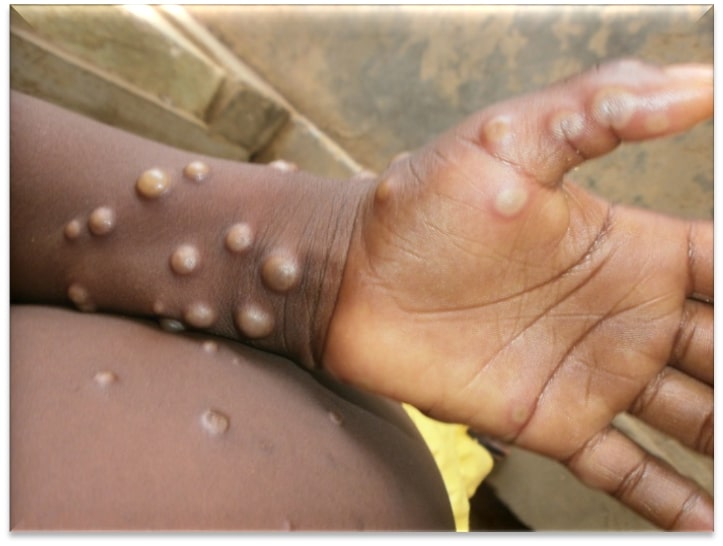
Monkeypox is a rare viral disease that was first discovered in 1958 in monkeys kept for research. The disease was first reported in humans in 1970, when cases of a pox-like disease were observed in a group of people in the Democratic Republic of Congo. The virus that causes monkeypox is closely related to the viruses that cause smallpox and cowpox, but it is less severe in humans than smallpox. Monkeypox is primarily found in Central and West Africa, where it is believed to be transmitted to humans through contact with infected animals.
The virus that causes monkeypox is a member of the orthopoxvirus genus, which also includes the viruses that cause smallpox and cowpox. The virus is a double-stranded DNA virus that replicates in the cytoplasm of infected cells. Monkeypox is primarily a zoonotic disease, meaning it is transmitted from animals to humans. Rodents, monkeys, and other non-human primates are the primary hosts for the virus.
Monkeypox can cause a range of symptoms in humans, including fever, headache, muscle aches, backache, swollen lymph nodes, chills, and exhaustion. The disease can also cause a rash that starts on the face and then spreads to other parts of the body, including the palms of the hands and the soles of the feet. The rash usually progresses to pustules, which eventually scab over and fall off. In severe cases, the rash can cover the entire body.
Monkeypox is usually a self-limiting disease, meaning that it typically resolves on its own without treatment within two to four weeks. However, in some cases, monkeypox can cause severe complications, such as pneumonia, sepsis, and even death. The mortality rate for monkeypox is estimated to be between 1% and 10%, depending on the outbreak and the population affected. Children are more likely to develop severe disease than adults.
The best way to prevent monkeypox is to avoid contact with infected animals and to practice good hygiene, such as washing hands frequently and avoiding contact with bodily fluids of infected individuals. People who work with animals, such as veterinarians and animal handlers, are at increased risk of contracting monkeypox and should take appropriate precautions, such as wearing personal protective equipment. There is no specific antiviral treatment for monkeypox, although supportive care, such as fluid replacement and pain relief, can help alleviate symptoms.
Monkeypox has only been reported in a few cases outside of Africa, including in the United States, the United Kingdom, and Singapore. Most of these cases were linked to travel to Africa or contact with imported animals. The largest outbreak of monkeypox outside of Africa occurred in the United States in 2003, when 47 cases were reported in six states. The outbreak was linked to pet prairie dogs that were infected with the virus and sold as pets.
Monkeypox is considered a potential bioterrorism agent because it can be transmitted from person to person and there is no specific treatment or vaccine available. However, the risk of a deliberate release of monkeypox virus is considered low. Monkeypox is classified as a Category B bioterrorism agent by the Centers for Disease Control and Prevention (CDC), meaning that it is moderately easy to disseminate and has moderate morbidity and mortality rates.
In 2018, a monkeypox outbreak occurred in Nigeria, with 172 confirmed cases reported. The outbreak in Nigeria was the largest ever recorded, surpassing the previous record of 150 cases during an outbreak in the Democratic Republic of Congo in 2001-2002. The outbreak in Nigeria was linked to consumption of monkey meat and contact with infected animals, and it spread to 14 other states within the country. The Nigerian government responded to the outbreak by implementing measures such as isolation of infected individuals and contact tracing to prevent further spread of the disease.
In 2021, monkeypox was reported in the United Kingdom in two individuals who had recently traveled to Nigeria. This was the first time that monkeypox had been reported in the UK since 2018. The individuals were isolated and treated, and there were no reports of further spread of the disease.
One of the most interesting aspects of monkeypox is its similarity to smallpox, which was eradicated in 1980 through a global vaccination campaign. Monkeypox was first identified as a separate disease in 1958, and scientists have been studying the virus and its potential as a bioterrorism agent ever since. In addition, research on monkeypox has led to new insights into the immune system and the development of new antiviral drugs.
Monkeypox is not a new disease, but it has received increased attention in recent years due to the potential for outbreaks and the lack of a specific treatment or vaccine. Researchers are working to develop a monkeypox vaccine that could protect against the disease and prevent future outbreaks. In addition, new antiviral drugs are being developed that could be effective against monkeypox and other related viruses.
The name “monkeypox” is somewhat misleading, as monkeys are not the primary source of the virus. The disease is primarily spread through rodents and other small mammals, with monkeys and other primates serving as occasional hosts. However, the name has stuck and is now widely used to describe the disease.
Monkeypox is a zoonotic disease, meaning that it is transmitted from animals to humans. The disease is most commonly spread through contact with infected animals or their bodily fluids, such as blood, urine, or feces. In addition, the virus can be spread from person to person through respiratory droplets or contact with skin lesions.
The symptoms of monkeypox can be similar to those of other diseases, such as chickenpox and measles, which can make diagnosis difficult. However, there are some distinct features of monkeypox that can help doctors differentiate it from other diseases, such as the progression of the rash from the face to the extremities and the presence of lymphadenopathy.
Monkeypox outbreaks can have significant economic and social impacts in affected areas, particularly in rural communities. The disease can cause widespread illness and death among livestock, which can have a devastating effect on the livelihoods of farmers and their families. In addition, the fear and stigma associated with monkeypox can lead to social isolation and discrimination against affected individuals and communities.
Monkeypox is a disease that affects both humans and animals, highlighting the interconnectedness of human and animal health. The One Health approach, which recognizes the links between human, animal, and environmental health, is an important framework for understanding and addressing zoonotic diseases like monkeypox.
Monkeypox is a disease that has been largely neglected by the global health community, due in part to its rarity and the fact that it is primarily found in low-income countries. However, as the recent outbreaks in Nigeria and the UK have shown, monkeypox is a disease that cannot be ignored.
Monkeypox is one of many zoonotic diseases that have the potential to cause significant harm to human health and well-being. In order to prevent and control these diseases, a multifaceted approach is needed that includes surveillance, prevention, and control measures at the animal-human-environment interface.
The global COVID-19 pandemic has highlighted the importance of preparedness and response to emerging infectious diseases like monkeypox. The lessons learned from the COVID-19 response can be applied to other diseases, including monkeypox, to improve our ability to prevent, detect, and respond to outbreaks.
In addition to the potential health impacts of monkeypox, there are also important ethical considerations surrounding the use of animals in research and disease surveillance. The use of animals in scientific research is controversial, and there are ongoing debates about the ethical implications of animal research and the use of animals in disease surveillance and control.
Monkeypox is just one example of the many challenges facing global health today. Other emerging infectious diseases, as well as longstanding health issues such as malnutrition and access to healthcare, also require attention and resources. Addressing these challenges will require a sustained commitment to public health, research, and international cooperation.
Monkeypox is a reminder of the interconnectedness of the world and the importance of global health. Diseases do not recognize borders or boundaries, and the health of individuals and communities is inextricably linked to the health of the planet. Addressing global health challenges like monkeypox will require a coordinated and collaborative effort from governments, organizations, and individuals around the world.
Despite the challenges posed by monkeypox and other infectious diseases, there is reason for hope. Advances in science and technology, as well as increased awareness and investment in public health, have led to significant progress in the fight against diseases like smallpox and polio. With continued innovation and collaboration, it may be possible to one day eliminate diseases like monkeypox as well.
Monkeypox is a reminder of the importance of basic public health measures like handwashing and vaccination. While there is currently no specific vaccine for monkeypox, the smallpox vaccine can provide some protection against the disease. In addition, practicing good hygiene, avoiding contact with infected animals and their bodily fluids, and seeking medical care promptly if symptoms develop can all help to prevent the spread of monkeypox.
Monkeypox is a reminder of the resilience of human beings in the face of disease and adversity. Despite the challenges posed by monkeypox and other infectious diseases, humans have shown time and time again that they are capable of coming together to fight disease and protect each other’s health and well-being. Through collaboration, innovation, and a commitment to global health, we can work together to prevent and control monkeypox and other infectious diseases, and create a healthier, more just world for all.









